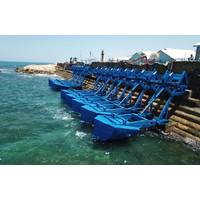Gabon to Boost Oil Sales, Eyes Acquisitions
- State oil firm created by decree in 2011
- Says in talks to acquire new oil block
- Wants to market up to 14 oil cargoes a month
State-owned Gabon Oil Company plans to purchase new oil assets and market a bigger portion of Gabon's crude oil, its chief executive told Reuters, aiming to grow to compete alongside international oil firms.
GOC was created in mid-2011 by presidential decree, more than two decades after Gabon started producing oil. The country is now sub-Saharan Africa's fifth-biggest oil producer, pumping around 250,000 barrels per day, down from a peak of 370,000 bpd in the late 1990s.
"Our strategy for growth is based on acquisitions and on going after marginal fields and going after permits that expire as well as exploration," CEO Serge Toulekima said on the sidelines of the New York Forum in Libreville, the capital of the Central African country.
He said the company was currently in talks to secure financing with a London-based bank to acquire an oil permit and hoped to finalise the deal this year.
For future exploration permits, GOC will negotiate to acquire the assets from the state and then seek partners to take a share in exchange for help in funding exploration.
Marketing Share
Toulekima, formerly a reservoir engineer at Chevron (CVX), said that another goal was to increase GOC's share of Gabon's oil sold onto international markets. Last year, it sold 10 cargoes of about 650,000 barrels, or around 7 million barrels, and this could be boosted to around 14 cargoes, or 9 million barrels, next year, he said.
"We need to increase our volumes for marketing. We are in discussion with various companies to see if we can market their share of the oil in all the permits where they are present," he said.
GOC became an operator in 2013 after taking over the Obangue field last year from Sinopec's Addax Petroleum, after the government alleged a breach of contract. The legal dispute has now been settled, and Addax has since recovered the field.
Although it is currently not operating any fields, it plans to restart production at an abandoned field called Remboue in the fourth quarter of 2014.
Libreville told the World Trade Organisation in a confidential document last year that GOC would be entitled to a stake of up to 15 percent in oil blocks owned by other companies, under a planned new hydrocarbons law.
Toulekima declined to comment on the impact of the new law on GOC's operations. Among the country's largest producers are Total, Perenco and Royal Dutch Shell (RYDAF).
Many others such as Ophir Energy (OPHRY), ExxonMobil and Eni are interested in exploring offshore following the launch of negotiations for new licences last year.
Oil accounts for around 50 percent of Gabon's gross domestic product and 80 percent of export earnings.
GOC also plans to become involved in oil refining and has signed a contract with Samsung C&T to build a new 60,000 barrel per day refinery at Port-Gentil.
Details of the ownership structure and the timing of the refinery were not given.
"The production will mean Gabon can not only substitute the current petroleum product imports, but also be a hub of petroleum product trading in West Africa," a GOC statement said.
(By Emma Farge and Jean Rovys Dabany, editing by Jane Baird)




